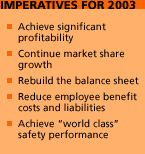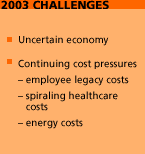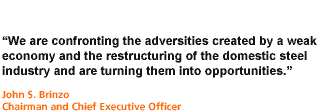

 |
 |
|||
  
|
 
A year ago, we said 2002 would be a pivotal year for Cliffs. Our projection proved true as 2002 turned out to be a year in which our actions turned adversities into opportunities. We took the lead in remaking the North American iron ore industry and transformed Cliffs into the pre-eminent supplier of iron ore pellets to the North American steel industry. While we entered 2002 with a sense of purpose, the outlook was dismal. Our largest customer, LTV Steel, had just closed its doors and announced that it was liquidating. LTV's collapse had forced the idling of the Empire Mine and left us with a sales forecast that represented only 70 percent of our production capacity. We were looking at yet another year of massive production curtailments and their related costs. On top of that, our HBI plant in Trinidad was idle due to a poor outlook. In short, we were facing a very uncertain and challenging year. As the year unfolded, the former LTV steelmaking assets were restarted by a new company, International Steel Group (ISG), and steel industry fundamentals improved. We initiated a number of creative and innovative transactions to increase our sales volume and position Cliffs to serve a “new” steel industry going forward:
We started 2002 with 12.2 million tons of capacity and ended the year with 19.5 million tons, a 60 percent increase. At the beginning of 2002, we owned 15 percent of the total pellet capacity in North America. At the end of 2002, we owned 25 percent of the total capacity. We continue to pursue additional capacity with several other steel companies where a transaction makes economic sense for both Cliffs and the steel company. As our financial results demonstrated, not everything turned out to be positive in 2002:
Results from continuing operations, excluding the Empire asset impairment charge, were significantly better than 2001 results. The improvement was principally due to higher pellet sales and production volume. Revenues from pellet sales were up by almost 70 percent, with a significant percentage of the increase due to the sale of pellets to ISG and Algoma under new sales agreements. Cliffs' pellet production almost doubled and, most importantly, there were fewer production curtailments in 2002. The cost of production curtailments was $21 million in 2002 versus $48 million in 2001. We were profitable on an operating basis the last two quarters of 2002 and realized a $12.7 million gross margin on pellet sales of 4.5 million tons in the fourth quarter. EBITDA from continuing operations was $31 million for the full year and $17 million in the fourth quarter. We managed our cash position very carefully in 2002. We generated $41 million in cash flow from operating activities, which allowed us to invest $17 million in ISG, $10 million in Rouge and $11 million for mine capital expenditures. We amended our senior note agreement in December and reduced our leverage. Our safety record continued to improve in 2002 and is now the best in Cliffs' history. Our Mine Safety and Health Administration (MSHA) reportable accident and lost-time accident frequency rates were both down by more than 30 percent versus 2001. The Northshore Mine has been a leader in safety performance in the iron ore mining industry and has won a number of national, state and Company awards over the past several years. Northshore's mining operation had no lost-time injuries for the second year in a row, and once again qualified for the Sentinels of Safety Award presented annually by MSHA and the National Mining Association. We discuss our safety performance for 2002 in more detail on the Safety Performance 2002 page. Our ForCE 21 Operations Excellence program continues to produce cost savings and improvements in product quality and safety. Mine operating costs, excluding costs of production curtailments, were down by 5 percent compared to 2001 costs. We have utilized almost 100 CAP (Change Acceleration Process) teams since the commencement of the program in April 2000 and have trained hundreds of employees to be members of CAP teams. The teams provided over $7 million in cost-reduction benefits on an annualized basis in 2002. Our maintenance leadership team has been particularly effective and reduced maintenance costs by 37 cents per ton in 2002 and 67 cents per ton since the inception of the team. The Tilden Mine was the 2002 winner of the Operations Excellence ForCE 21 Award for outstanding achievement.
As we grow our production capacity, convert partners into customers and increase our customer base, sales margin is critical. Today, we are a customer-driven company like never before. We can achieve success only if we produce and deliver to our customers iron ore pellets that meet or beat the competition in terms of both quality and price. Most importantly, we must achieve this objective in a way that allows Cliffs to restore its profit margins and attract investors. While iron ore consumption by integrated steelmakers in North America has declined by almost 35 percent since 1980, Cliffs' market share has increased significantly. In 1980, Cliffs' sales represented less than 4 percent of total iron ore consumption. In 2003, Cliffs' sales will approach 30 percent of total consumption. Going forward, our earnings will be determined largely by how well we reduce our costs, and we are intensely focused on cost reduction in every phase of our business. The most serious cost issue facing Cliffs today is the rapidly rising cost of pension and retiree healthcare benefits. Like most companies across corporate America with defined benefit pension plans, we were required to record a substantial increase in our minimum pension liability at the end of 2002. While the larger liability does not have a material impact on pension funding requirements in the near term, we must address the ultimate impact. Healthcare costs have always been difficult, and they are becoming a bigger issue as time progresses. It is very clear that without a significant modification of pension and retiree healthcare benefits, the associated costs will continue to rise at a dramatic rate and will eventually become unaffordable. We are exploring all options to better manage our employee benefit obligations. In 2002, we modified our salaried retiree healthcare program to require additional cost sharing by our current salaried retirees. We will be implementing changes to our active salaried benefit programs in 2003 that will materially reduce our legacy costs going forward. While our labor contracts with the United Steelworkers Union do not expire until July 31, 2004, it is clear that benefit changes must be made throughout the Company, and we are keenly attuned to related developments in the steel industry. While we continue to make good progress in pursuing productivity and cost-reduction objectives, our successes are currently being adversely impacted by higher energy costs, notably natural gas and diesel fuel costs. We are switching to alternative fuel sources wherever we can, and all operations are taking actions to minimize consumption. With energy costs, including electricity, representing more than 20 percent of mine operating costs depending on the mine, actions taken in this area are vitally important.
The year 2003 will be another pivotal one for Cliffs as the long-talked-about consolidation of the North American steel industry continues. We believe consolidation will ultimately produce a stronger, more competitive industry. At the same time, we are mindful that consolidation may accelerate the shrinkage of some integrated steelmaking capacity, which is not a positive for iron ore consumption. We are managing our business with the expectation that shrinkage will ultimately occur, and we continue to seek opportunities to work with those who are restructuring the steel business so that we can continue to grow our market share. While we are concerned about steel fundamentals, we are starting 2003 with a full order book. Our 2003 sales volume is expected to be a record 20 million tons. As a result, we expect to operate our mines at capacity levels and avoid the idle costs that have so severely penalized our financial results the last two years. Although we have made progress in restructuring our business, there are still many challenges on the road ahead. Notwithstanding our cost challenges, we are confident that we will achieve profitability and rebuild our balance sheet in 2003. Last year, we lost a great friend and business associate with the death of M. Thomas Moore, my predecessor and mentor throughout my career at Cliffs. Tom was Cliffs' Chief Executive Officer for 11 years and a 31-year employee until his retirement in 1997. During his career, he made many contributions to Cliffs and led the Company to financial success after the steel industry depression in the 1980s. He too confronted many adversities and turned them into opportunities. Tom made an indelible mark wherever he went. We will miss him. In closing, I want to thank each and every employee of Cliffs for their exceptional efforts in 2002. The innovative commercial transactions, financial restructurings, operational improvements and continued safety performance are a testament to the talents and contributions of everyone. We are confronting the adversities created by a weak economy and the restructuring of the domestic steel industry, and are turning them into opportunities. In 2003 we intend to capitalize on our 2002 accomplishments and demonstrate that we can produce value that will reward shareholders, employees and the many others that have a stake in Cliffs. We appreciate your support.
|